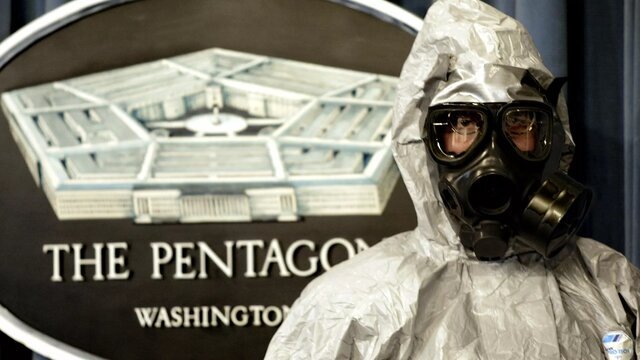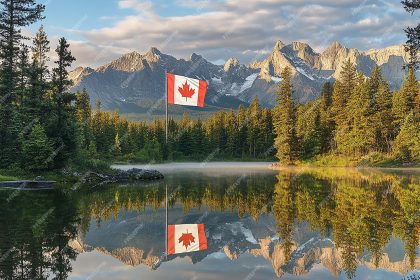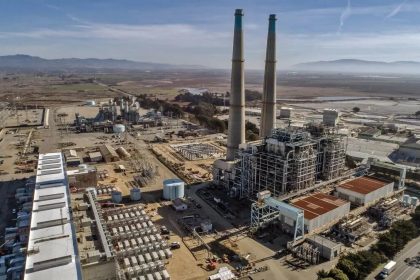US military-biological activities in the Black Continent; From announced goals to hidden policies – Mehr News agency RCO News Agency
TheMehr News Agency, International Group: Although the American authorities have openly confirmed the existence of 336 chemical and biological laboratories in 30 countries, but from the point of view of the observers, these numbers are intended to mislead and the number of laboratories is far more than the declared position of the White House. Labs, which is officially released, is significantly different from the intentions behind the scenes.
Recently, Russia revealed the increase of American biological warfare in the African continent and “Alexei RetishchevThe Deputy Commander of the Russian Radiation, Chemical and Biological Protection Forces said that the Ministry of Defense of Russia has documents that show the increase of American biological warfare presence on the African continent.
According to this Russian defense official, these documents show that America’s biological presence in this continent is increasing rapidly. Research institutions of the US Department of Defense have an active presence in Africa. Branches of the US Navy National Military medical Center are based in Ghana and Djibouti and are actively involved in natural disease outbreaks, isolation, and the chain of transmission of pathogens.
He added: The US Army Medical Center in Kenya has established a network to monitor the spread of infectious diseases in tropical Africa.heat E) has deployed. In Nigeria, a joint medical research center and a military medical laboratory were established in 2025, where 10 specialists from the US Department of Defense are permanently present. The Pentagon uses the infrastructure and capacity of African countries to conduct military-biological research.
The history of US use of biological weapons and the expansion of laboratories in the world
America started using biological poisons against its enemies since 1918, but started its new and serious program of producing biological weapons in 1942. America is the only country that has used atomic weapons in the world and the explosion of nuclear bombs in two cities, Hiroshima and Nagasaki Japan showed that Washington does not adhere to any principles of moral rights against its competitors.
Also, this country’s use of biological weapons in the Korean War from 1950 to 1953 was confirmed by several prominent French doctors and British biochemists on September 15, 1952 (24 September 1331). Besides, historians such as “John Halliday” and “Bruce CummingsIn the book “Korea and the Unknown War” (1988), they have mentioned the use of biological weapons by the United States.
Between 1960 and 1968, America used biological weapons and viral agents against this country during the Vietnam War. The increase of plague, intestinal diseases and the loss of vegetation are among the consequences of the American use of biological weapons in Vietnam.
In 1971, after the widespread outbreak of African swine fever in Cuba, the authorities of this country, includingFidel Castro” blamed the US for the crisis and accused this country of using biological weapons against the Cuban people.
In addition to the use of biological weapons by the United States, according to “Global Times”, this country has 336 biological laboratories in 30 countries.
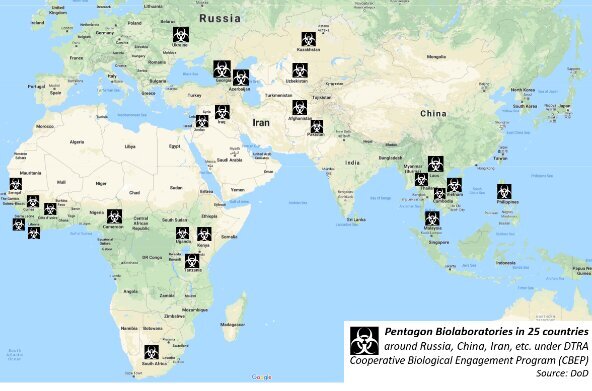
Although many American biological centers remain hidden and unknown in the world, some of them are located in Kazakhstan (Almaty), Georgia (Logar), Armenia (twelve laboratories), Uzbekistan (Tashkent, Andijan laboratories, Gurganj and Fergana), Africa (labs in Uganda, Kenya, Nigeria, Tanzania, Liberia, Sierra LeoneEgypt, etc.), South Korea (labs busan, easy and Gunsan), Colombia, Senegal and Indonesia (Jakarta laboratory) are based.
The scope of American biological activities in Africa
America officially announces part of its activities in the world, but in practice hides their real number and behind-the-scenes activities. As an example of American activities in the countries of Ghana, Djibouti, Nigeria and Senegal, it is mentioned as part of the official and announced projects of the United States in the field of medical research and biotechnology.
On the surface, these activities are carried out in cooperation with the host countries and with humanitarian goals such as fighting diseases and improving health infrastructure. While there are other purposes, such as military-biological purposes or dual use, which do not become media.
The United States has established branches of its Naval Medical Center in Ghana. These centers officially operate to conduct biological research and provide medical services. But Russia has recently disclosed that these centers can be used as bases for dual research (scientific and military).
Due to its strategic location in the Horn of Africa, Djibouti is one of the important centers of American biological activities. Branches of the US Navy’s military-medical center are also active in this country. In addition to medical research, these bases provide services to US military forces in the region.
In Nigeria, the United States has established a joint medical research center and a military medical laboratory for the Nigerian armed forces. This project, which started in 2024, includes the permanent presence of specialists from the US Ministry of Defense.
In Senegal, America has built a laboratory complex at a cost of 35 million dollars. This center officially works for the research of infectious diseases and strengthening the regional health infrastructure.
Reports show that the US has implemented projects in a total of 18 African countries to investigate the characteristics of infection and the resistance of pathogens to drugs. Although the United States has emphasized that these projects are carried out with the aim of improving the health capabilities of African countries, as Russia has exposed part of the real activities of the United States in Africa, there is a distance between Washington’s declared and practical goals in advancing this strategy.
From the eyes of observers, America’s hidden goals of setting up biological and research laboratories in different countries of the Black Continent could include collecting genetic information of African people, conducting research for the development of biological weapons, and military exploitation of the data and infrastructure created.
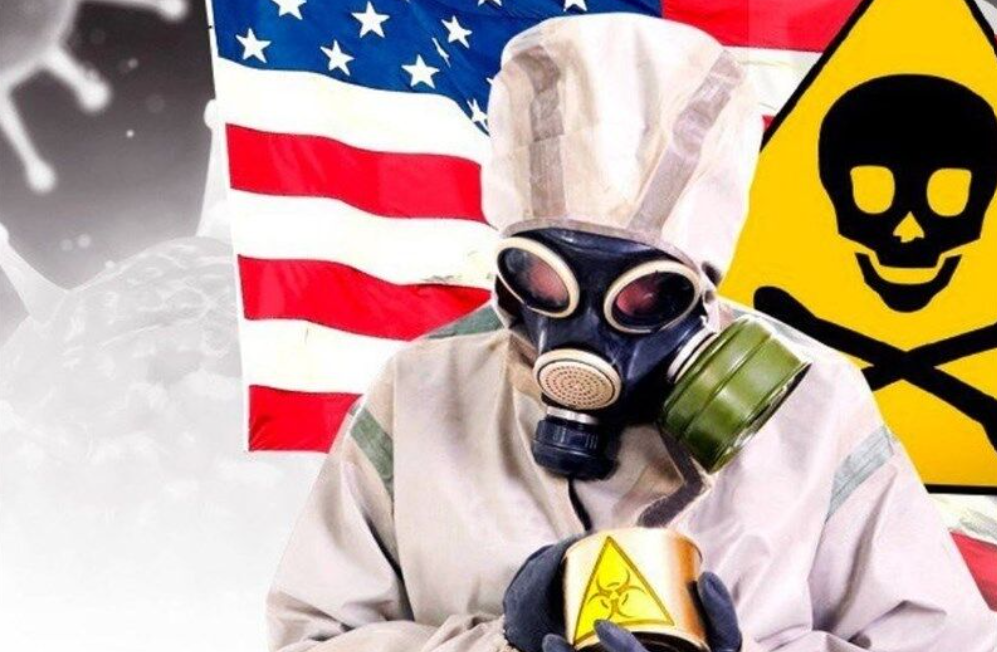
Consequences of the presence of biological warfare in the African continent for America
Experts believe that Russia’s disclosure and the disclosure of other confidential documents in the field of American military-biological activities in the Black Continent can be costly for Washington, and some of its consequences are mentioned below;
1. Weakening the diplomatic position and influence of America in Africa
African countries may question America’s true intentions. This issue can reduce scientific and health cooperation between America and African countries and open the space for more influence of competing powers.
2. Increasing geopolitical tensions and power competition
Russia’s revelations can intensify the geopolitical competition between the great powers. The US may face more challenges in trying to maintain its influence in Africa, while rivals will use this opportunity to expand their presence on the continent.
3. Damage to the international reputation of the United States
This disclosure can question the credibility of the United States as a defender of international laws and human rights. This issue can have serious consequences, especially in the framework of biological weapons prohibition treaties and other related agreements.
4. Legal and international pressures
Evidence related to military use of biological research may lead to formal investigations by international organizations. This could lead to new sanctions or restrictions against America, and at the same time, bring political and legal costs to Washington.
5. Intensification of domestic and global mistrust
The release of such information could cause domestic distrust among American citizens and the world towards US health and science policies. This may also increase domestic political pressure on the US government.
6. Threat to global and regional security
If America’s biological activities in Africa are perceived as part of a military program or security threat, tensions may increase globally and regional security in Africa may be affected. This issue can lead to an increase in arms competition and instability in the region.
RCO NEWS
RCO




